Hey, friends — happy summer to you. A little extra daylight time for outside reading (although, dang, this heat! A good time to review some of the many eco-care books we’ve featured over the years, eh? Try the frank, enjoyable Our Angry Eden: Faith and Hope on a Hotter, Harsher Planet by the Presby Reverend, David Williams or the beautifully written Refugia Faith: Seeking Hidden Shelters, Ordinary Wonders, and the Healing of the Earth by the splendid Debra Reinstra. Or check, here for instance.)
We’ve been away from BookNotes for a week or so because we were prepping for our first major off-site event since the pandemic broke in March 2020. We were with the CCO in a very spacious room with a couple of our industrial-sized, very efficient, hand-made air purifiers (and a professional HEPA one, too.) We’ve been testing every day since being with those 150+ people and we’re still healthy. We hope you are cautious these days — the long Covid thing is painfully real and the ongoing consequences can be serious. For the public good and your own peace of mind, we hope you are masking at church and other inside gatherings. At least for a while, yet…
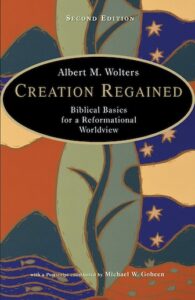 We were delighted that the CCO (the campus ministry we are affiliated with, still, and our largest overall client) spent several mornings revisiting their commitments from decades ago to draw on the reformational philosophy, or at least worldview, of the Institute for Christian Studies in Toronto, by examining the implications of Al Wolter’s Creation Regained: The Biblical Basis of a Reformational Worldview (Eerdmans – $15.00; our sale price = $12.00.) Our great pal Sean Purcell walked staff through — and interviewed me for a rollicking half hour — some of the background of the book. The first edition was dedicated to CCO staff as Al taught the book to CCO staff back in the 1970s. It was transformational then and it remains relevant today. I sometimes say to fans of our store that they should read it to learn more of what motivated us to open the store as we did.
We were delighted that the CCO (the campus ministry we are affiliated with, still, and our largest overall client) spent several mornings revisiting their commitments from decades ago to draw on the reformational philosophy, or at least worldview, of the Institute for Christian Studies in Toronto, by examining the implications of Al Wolter’s Creation Regained: The Biblical Basis of a Reformational Worldview (Eerdmans – $15.00; our sale price = $12.00.) Our great pal Sean Purcell walked staff through — and interviewed me for a rollicking half hour — some of the background of the book. The first edition was dedicated to CCO staff as Al taught the book to CCO staff back in the 1970s. It was transformational then and it remains relevant today. I sometimes say to fans of our store that they should read it to learn more of what motivated us to open the store as we did.
Sean had done some Zoom interviews with Al Wolters, and his old colleague at ICS, Calvin Seerveld, so it was a blast hearing from those friends and mentors as Sean taught about what it means to live into a spacious, embodied, culturally attuned lifestyle of imagining God’s Kingdom in every area of life.
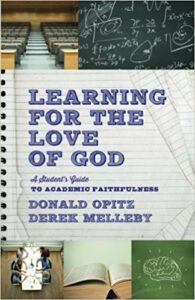 The historic Jubilee conference was created to help students as students (!) and books like Learning for the Love of God: A Student’s Guide to Academic Faithfulness by Don Opitz & Derek Melleby (Brazos – $17.00; our sale price = $13.60) and my own Serious Dreams: Big Ideas for the Rest of Your Life (Square Halo Books – $13.99; our sale price = $11.19) emerged out of that hope to help students think Christianly and live in reformational ways as they step into their callings, first as students and then as graduates. What a good time talking again with old and new CCO staff who partner with churches to cultivate relationships and mentor students into this full-orbed way of living in the good but fallen (and being fully redeemed) world.
The historic Jubilee conference was created to help students as students (!) and books like Learning for the Love of God: A Student’s Guide to Academic Faithfulness by Don Opitz & Derek Melleby (Brazos – $17.00; our sale price = $13.60) and my own Serious Dreams: Big Ideas for the Rest of Your Life (Square Halo Books – $13.99; our sale price = $11.19) emerged out of that hope to help students think Christianly and live in reformational ways as they step into their callings, first as students and then as graduates. What a good time talking again with old and new CCO staff who partner with churches to cultivate relationships and mentor students into this full-orbed way of living in the good but fallen (and being fully redeemed) world.
From old titles like Brian Walsh’s Subversive Christianity (with one hefty, prophetic essay which was first given at a Jubilee conference) to Rainbows for the Fallen World (ditto) to the several heady, radical books by Richard Middleton to the new Amy Sherman title Agents of Flourishing to old classics for CCO friends by former Jubilee director Steve Garber (Fabric of 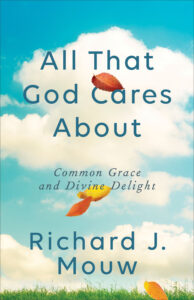
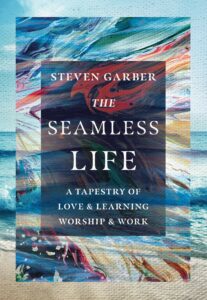 Faithfulness, Visions of Vocation, and The Seamless Life) we had a lot that were german. Naturally, we had lots and lots of books on race and racism and lots of books about what we might call “public theology.” Richard Mouw’s All That God Cares About: Common Grace and Divine Delight even talks about CCO and Jubilee and our broad, relevant, bookselling efforts.
Faithfulness, Visions of Vocation, and The Seamless Life) we had a lot that were german. Naturally, we had lots and lots of books on race and racism and lots of books about what we might call “public theology.” Richard Mouw’s All That God Cares About: Common Grace and Divine Delight even talks about CCO and Jubilee and our broad, relevant, bookselling efforts.
All of this was right there with devotionals and contemplative spirituality, basic Christian discipleship (and disciple-making), theology, Biblical studies, evangelism, church life, worship, and so much more, from engineering to the arts, psychology to outdoor education, politics to gender studies. It’s fun to spread out and sell so many different sorts of things to those who are actually influencing tomorrow’s leaders.
WHICH BRINGS US TO…
THESE 12 BOOKS TO PRE-ORDER NOW.
As usual, we don’t run the credit cards you enter at our secure order form page until we send the books. The release dates are shown. A couple we already have, some are coming very soon, others not for months. If you want them bundled together, please say so. Let’s go!
By the way, you know you can pre-order almost anything from us. There are so many more exciting titles (of all sorts — fiction and nonfiction, children’s, youth, and for adults, religious and otherwise) all coming this season. (Maybe the one I’m most excited for: a forthcoming novel called Demon Copperhead by Barbara Kingsolver, releasing 10-18-22.)
Let us know how we can help.
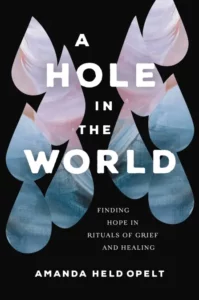 A Hole in the World: Finding Hope in Rituals of Grief and Healing Amanda Held Opelt (Worthy Books) $27.00 OUR SALE PRICE = $21.60
A Hole in the World: Finding Hope in Rituals of Grief and Healing Amanda Held Opelt (Worthy Books) $27.00 OUR SALE PRICE = $21.60
JUST OUT NOW
This just released last weekend and we were thrilled to send a few out already. You may know that Amanda the sister of the late Rachel Held Evans and this — oh, my, this! — is her stunning debut. I was hooked with just the introduction. What a wise and interesting (and heartfelt) approach this brings. About, yes, a “hole in the world.” Basically, each chapter explores a certain grieving practice or ritual (about most of which Amanda was unfamiliar) and how folks using that practice find it helpful. And how it did (or didn’t) help her in her own rapacious sadness from the loss of her beloved sister. She’s not Episcopalian the way Rachel ended up, so even the introduction (about Ash Wednesday services) brought fresh take.
Included are odd or lesser known customers such as covering mirrors and “telling the bees” to commonplace things like sharing casseroles and sending sympathy cards (a great chapter, by the way.) From her reflection on owning our mortality in “death rooms” to experiencing the power of mere presence in the chapter “Sitting Shiva” to the candor of wearing black, this book is wonderfully written, nicely done, and at times very, very moving. Highly recommended.
A Hole in the World is a wonderfully conceived and beautifully written book…It is, in part, an anthropology of grieving, a powerful memoir, and glimpses into a heartbreaking diary. In a world where rituals of grief are slowly vanishing, it reintroduces us to some of the most creative forms from Western culture. Most of the time the book is looking back on the rich history of rituals of pain, from cards to casseroles, from wearing black to sitting shivah. But it also looks forward, preparing our hearts for what will inevitably happen to us all. — Michael Card, songwriter and author of A Sacred Sorrow
A Hole in the World is both generous and generative, a book that tenderly guides us into the fierce landscape of our own losses, because the author has dared to walk there first. Few of us today know how to speak of our sorrows, but in this book, Held Opelt gives us language for loss that is honest, hopeful, and gorgeously human. — K. J. Ramsey, licensed professional counselor and author of This Too Shall Last and The Lord Is My Courage
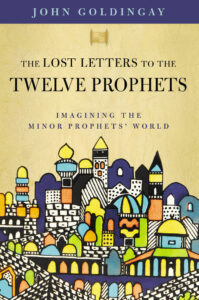 The Lost Letters to the Twelve Prophets: Imagining the Minor Prophets’ World John Goldingay (Zondervan) $22.99 OUR SALE PRICE = $18.39
The Lost Letters to the Twelve Prophets: Imagining the Minor Prophets’ World John Goldingay (Zondervan) $22.99 OUR SALE PRICE = $18.39
JUST OUT NOW
This is another book that we just got in and I’m excited. I have not started it yet but you should know that not only is Goldingay a brilliant scholar (and a prolific one, having turned in the “Old Testament for Everyone” series quicker than it took Tom Wright to finish up the New Testament ones.) He has done exquisite academic volumes and pop level ones as well. This, though — wow! It is curious, fun, even. Get this!
To help us understand the unique setting and context of each of the (so-called) minor prophets he writes a fictional letter to each which kicks off a sometimes furious conversation between the fictional character and the prophet declaring back the Word of the Lord.
Along the way Goldingay offers background (and foreground) and maps and some context for the lively exchanges. If you know anything about the theology and tensions of the Hebrew prophets, you can imagine the sorts of questions these letters hold. It becomes, in the words of one early reviewer “a sparkling exercise.”
Disciplined imagination is a powerful tool in bringing the scriptures to life and John Goldingay puts his well-informed imagination to work here in ways that entertain and educate in equal measure. — Christopher J.H. Wright, Langham Partnership
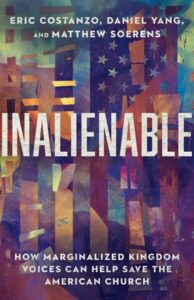 Inalienable: How Marginalized Kingdom Voices Can Help Save the American Church Eric Costanzo, Daniel Yang, Matthew Sorens (IVP) $18.00 OUR SALE PRICE = $14.40
Inalienable: How Marginalized Kingdom Voices Can Help Save the American Church Eric Costanzo, Daniel Yang, Matthew Sorens (IVP) $18.00 OUR SALE PRICE = $14.40
JUST OUT NOW
Well, maybe reading the letters to the Hebrew prophets will help us all lean into the prophetic message a bit more, but if not, this surely will. What a study! Three rigorously evangelical and thoughtful faith leaders, each with a passion for multi-ethnic and cross-cultural ministry, combine to explore how marginalized voices are important —essential, now more than ever! — for the church to regain Biblical fidelity and credibility before a watching world.
These authors, you may care to know, are not firebrands working out of a progressive worldview or theologically odd. They are conventional, solid scholars and leaders working within the broad coalition of evangelical mission and evangelism folks. Among other things, they invite us to “decenter ourselves from our American idols and re-center on the undeniable, inalienable core reality of the global, transcultural Kingdom of God.” The guides to this journey are, among others, global Christians and the ancient church and the poor. We simply must learn from their witness.
Our Anglican friend Tish Harrison Warren says, “This is a must-read for all Christians who long to see renewal in American evangelicalism.” Derwin Gray, a black author (of How To Heal Our Racial Divide) calls it “some strong-but-needed medicine.” I agree. Order it today!
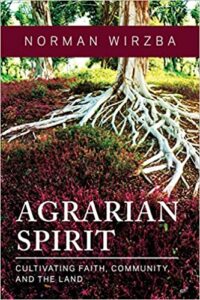 Agrarian Spirit: Cultivating Faith, Community, and the Land Norman Wirzba (University of Notre Dame Press) $29.00 OUR SALE PRICE = $23.20
Agrarian Spirit: Cultivating Faith, Community, and the Land Norman Wirzba (University of Notre Dame Press) $29.00 OUR SALE PRICE = $23.20
RELEASE DATE – AUGUST 1, 2022
We have highlighted this before so I won’t say much. The flow of the book is remarkable, though, and I’d dare say there is nothing like it in print. In this sense, it is a must-read for at least three kinds of folks: new agrarians (and Wendell Berry fans), those interested in spirituality and contemplative formation, and, well, those who are not interested in that, because you ought to be.
The first third of the book is a careful, clarifying orientation to an agrarian worldview. He notes, importantly, that this is not primarily a matter of whether one is a farmer or not, or whether one lives in a rural area or not. Obviously, one can be a bad/non-agrarian farmer and one can embrace the fundamental orientation of an agrarian view and not work the land. One can be an agrarian in the city and one can be a rural dweller and have no loyalties to place or sustainable practices. So Wirzba, a farmer and scholar, tells it like it is. His definitions and explorations remind me a bit of his excellent (and under appreciated) Living the Sabbath: Discovering the Rhythms of Rest and Delight, if more studious.
Secondly, then, and the heart of this notable work, is how one can embrace a spirituality informed by the agrarian views and practices explored in the first portion of the book. Given his view of the nature of being human, our human calling and task (and a whole chapter called “The Placing of the Soul”), his elegant convictions about relationships and “agrarian sensibilities and responsibilities” can transform our typical approach to spiritual formation and Christian living.
It is an agrarian spirit that informs the book and it is, yes, an agrarian spirituality that is on offer here. He shows how to embody and cultivate learning to pray (with eyes on God and creation), learning to see (ourselves as creatures, naturally) learning what he calls “descent” and humility and generosity. These are core values of a nonrealistic, deeply creational vision and the spiritual exercises he shares point us, finally, towards “learning to hope.”
I know I shared a few of these lovely endorsements before, but, to inspire you to pre-order it asap, here’s some wise words enticing you to buy and read and ponder this good book. As Bill McKibben puts it, “Norman Wirzba has done it again: this is — literally and figuratively — the most grounded (and grounding) book I’ve read in a long time. It will lead you to contemplation, and then, if you’re lucky, to change.”
This lovely book is full of invigorating surprises. For the many of us who don’t live on farms, Wirzba’s reflections offer an invitation to reclaim in practical ways our relationship with the earth and its creatures who, with us, depend on all that has been entrusted to us for stewardship, for sharing, and for grateful enjoyment. — Marilyn Chandler McEntyre, author of Caring for Words in a Culture of Lies
Agrarian Spirit isn’t luddite, nostalgic, or angry. Rather, it’s a gentle, wise, and hopeful call forward, casting a vision for how to live as God’s people in God’s world. I loved this book, and it flooded my imagination with pictures of what the Kingdom of Heaven could be, right now, right in my neighborhood. — Andrew Peterson, author of The God of the Garden
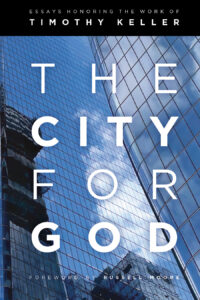 The City for God: Essays Honoring the Work of Timothy Keller edited by Ned Bustard (Square Halo Books) $24.99 OUR SALE PRICE = $19.99
The City for God: Essays Honoring the Work of Timothy Keller edited by Ned Bustard (Square Halo Books) $24.99 OUR SALE PRICE = $19.99
RELEASE DATE – AUGUST 1, 2022
I have not mentioned this widely as of yet because it was, literally, a surprise. It is one of these books that was compiled without the honoree knowing, a festschrift. A copy was sent a few weeks ago, now, to Tim in New York and he and his wife were flabbergasted and impressed. Hooray.
Square Halo Book-meister Mr. Ned Bustard had this dream of honoring Keller. Their first big book, It Was Good: Making Art to the Glory of God has a good chapter by Tim and as Ned explains in his own fabulous essay in The City for God, he has been inspired to do art and steward his gifts of creativity in part inspired by the steadfast, whole-life gospel preaching of the artful Reverend. And so, as book-makers do, Ned set out to find a whole handful of friends and colleagues of Keller to offer thoughtful chapters in his honor. As a book it is a major success and a wonderful resource for anyone wanting to stand on the shoulders of Keller’s invigorating efforts at Redeemer in Manhattan and his lively City-to-City church consulting and planting ministry.
Some festschrifts, by the way, are too academic, random collections done in tribute, but not connected to the person or the reader, really, and not very useful. These are often written by next-generation scholars of a professor. This is not that. Others may be nice collections of stories and testimonials, self-published paperbacks offering earnest but often in-house tributes. This book really isn’t that, either, although most chapters have some very impressive stories about Tim and his character and his ministry. The City for God is a good tribute and it does honor Keller but the chapters (and there are some great stories, including the very first in the intro by Russell Moore) are so inspiring and the insights so vivid that I cannot imagine a person of faith who would not be blessed and, hopefully, impressed, by this wide collection of good, good words. In a way, it is a handbook of living robustly in-but-not-of the world. The contributors are teachers and business leaders, novelists and pastors, stay at home parents and working artists, theologians and activists.
Some of the authors are not surprising to see here, esteemed writers in the Keller orbit, from Scott Souls to Mark Bertrand to Katherine Leary Alsdorf (co co-founded with him the esteemed Center for Faith & Work and Gotham Fellows network.) Others are leaders in various arenas offering good insight on how Keller shaped them, and showing the fruit of having paid attention. A.D. Bauer has a piece on prayer; Denis Haack has an excellent piece on “accessibility.” Charlie Peacock (with jazz bassist John Patitucci) has a piece on jazz, actually. We get Jenny Chang on mercy, Judy Cha on counseling, Annie Nardone on apologetics, William Edgar on hope. Wow.
The 20 chapters are broken down into three major sections — gospel, city, and vocation. We have great pieces on everything from rhetoric to creativity, from influence to cities, from work and business and leadership and legacy.
Like most Square Halo books, The City for God: Essays Honoring the Work of Timothy Keller is expertly curated, wonderfully designed, and will hold up for years to come, not only as a retirement gift of one Tim Keller, but as a flare sent up into the dark sky, offering light that illumines our day to day lives. This is a wise and inspiring and enjoyable book. Order it today.
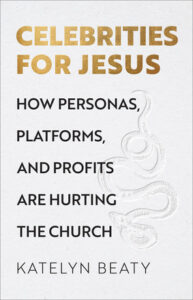 Celebrities for Jesus: How Personas, Platforms, and Profits Are Hurting the Church Katelyn Beaty (Brazos Press) $24.99 OUR SALE PRICE = $19.99
Celebrities for Jesus: How Personas, Platforms, and Profits Are Hurting the Church Katelyn Beaty (Brazos Press) $24.99 OUR SALE PRICE = $19.99
RELEASE DATE – AUGUST 16, 2022
Of this list of a dozen good books, this is one that is rightfully garnering some early attention. It may be the kind of book that you may think you understand (and thereby maybe don’t think you need to order it) or you may wait to just watch a video or listen to one of the many podcasts Ms Beaty is on. And, I dare say, you would be wrong. This book is more than you realize, timely and urgent, even, and, finally a call to most of us, to repent of our nonsense, grow up, and live well. Oh yeah — I started this mildly interested in some good gossip about salacious pastors (like Carl Lentz of New York Hillsong) and boisterous bros (like the macho-man Mark Driscoll.) Or some sober discussion of the horror of Ravi Zachary’s or Bill Hybels. The luxury living Lentz isn’t my cup of tea and there already was a whole podcast dedicated to the rise and fall of Seattle’s Mars Hill, so I was only moderately interested, I’ll admit.
But already in her discussion of 19th century celebrity tools and the distinctions between fame and celebrity and how power plays into that, I was hooked.
I couldn’t stop reading Celebrities for Jesus and not because it gave the gist of the downfalls and poked at the religious rock stars. Rather, this urgent volume is a deeper study on the ways in which celebrity plays a role in who we will hear, who we trust, why we admire and even care about “stars” and the religiosity of all that. It examines how we perceive leaders (and how we often are on dangerous waters because we think more highly of them as we ought, and think about our own intimacy with those leaders more than is warranted.) The book offers sociology and story, wackiness and wisdom, and a firm, balanced exploration of platforms and profits. It reminds us of the seductive powers of media and fame and status.
I suppose I should admit that the chapter on the book publishing world was riveting. Oh my… from the amount paid (to some) in advances to ghost writing to our own odd desire to see authors on Instagram to the ethics of back cover blurbs (which are themselves sometimes manufactured) it is a vital chapter for anyone involved in the religious publishing world. (Katelyn now works as an acquisition editor for a major publisher, and before that she worked as editor of Christianity Today, so she is well situated to talk about how we outsource our discipleship, always eager for formulas and products, and how money still tends to rule. She knows.) This chapter called “Chasing Platforms” will be crucial for many BookNotes friends.
Naturally, the book says what ought to be obvious: Beaty shows what celebrity is and how it is woven into the fabric of the evangelical movement (her chapter on the rise of Billy Graham, while not as compelling as the brilliant insights Kristin Du Muz in her Jesus and John Wayne, remains an important frame) even as she “identifies many ways fame goes awry, shows us how we all unwittingly foster a celebrity culture, and offers a vision of faithfulness to the Messiah who was despised and rejected.”
Did you catch that promise from the publisher’s pitch? It “shows us how we all unwittingly foster a celebrity culture.” That is, this is not a cheap shot at the obvious failures of the rich and famous. She could’ve been even harder and louder about millionaire pastors and mega-sized churches; I know she happens to prefer quieter and smaller congregations so this isn’t the work of a disillusioned former celebrity wanna be or one who was burned by a disingenuous megachurch staff. Rather, it is a freighted reflection, inviting us to ask hard questions of our own faith and our own complicated hearts. I found it very, very interesting.
She says stuff like that all this fame and fortune is a “feature, not a bug” of the system. Wow.
The third part is eloquent, under the headline “The Way Up is Down.” She explores “brand ambassadors” and cites the important little Henri Nouwen book on the temptations Christ faced (In the Name of Jesus.) Her call to “ordinary faithfulness” as we follow “the obscure Messiah” is really, really good. Celebrities for Jesus strikes me as a book that is laden with riches and importance for almost all of us, beyond the unpleasantness she uncovers and reports.
Listen to Karen Swallow Prior, herself an author and a bit of a spokesperson for certain sorts of faithful cultural witness. She writes, ”Beaty brings knowledge and insights that will help anyone wanting to disentangle their faith from celebrity culture. But, even more than this, she offers an honest, humble self-examination that is a model many of us in the church need to follow.”
Don’t believe us? Here is what historian Jemar Tisby (author of The Color of Compromise and How to Fight Racism) writes:
Stupendously convicting and well-researched. Celebrities for Jesus provides a timely, sober reflection on the toxic culture that often arises when piety and popularity mix.
Happily, there are many others who suggest this book is a fabulously important bit of social criticism and a wise rejoinder to our platforms and movements that too often turn sour. It got a starred review from Publisher’s Weekly which noted that it is a “must read for anyone invested in the fate of evangelicalism.”
And, I would say, it is useful for anyone with stars or celebrities, whether liberal or conservative, mainline or progressive. We all have our in-house shibboleths and our fangirls and boys. We all make a big deal out of this or that. Personas and platforms and profits combine in various configurations, so, please, don’t think this is just for evangelicals or just about snark. It is so much more than that. It is, finally, about the nature of power and the lure of idolatry.
Here is the table of contents:
Part 1: Big Things for God
1. Social Power without Proximity
2. The First Evangelical Celebrities
3. Megachurch, Megapastors
Part 2: Three Temptations
4. Abusing Power
5. Chasing Platforms
6. Creating Persona
Part 3: The Way Up Is Down
7. Seeking Brand Ambassadors
8. The Obscure Messiah and Ordinary Faithfulness
There is a fun and casual podcast called “Birds of a Feather” which is hosted by Australian Biblical scholar Michael Bird and US Biblical scholar Aimee Byrd. The other day they chatted up Katelyn Beaty about “fame vs celebrity, the role of publishers, influencers, consumeristic discipleship…” Check it out HERE.
 The Gospel of Peace in a Violent World: Christian Nonviolence for Communal Flourishing edited by Shawn Graves & Marlena Graves (IVP Academic) $40.00 OUR SALE PRICE = $32.00
The Gospel of Peace in a Violent World: Christian Nonviolence for Communal Flourishing edited by Shawn Graves & Marlena Graves (IVP Academic) $40.00 OUR SALE PRICE = $32.00
RELEASE DATE – AUGUST 16, 2020
Our bookstore may have more books on peace and nonviolence and peacemaking ministries in the world than any store we know of. It has been a passion of ours since before we opened and we continue to stock old and new books on how God’s love pushes us to resist violence and injustice in uniquely Christ-like ways. Nobody buys these books, of course, so we keep a lot of them in our overstock warehouse (otherwise known as our basement.) There has been a good crop of fresh ones these days and we are truly excited about the renaissance that God seems to be bringing with newer and younger writers exploring public justice, Christian peacemaking, and Biblical nonviolence, applied to questions beyond the obvious of war.This major work is the fruit of this very sort of fresh expression of Biblical visions of shalom and it is nothing short of magisterial.
I call it that — magisterial — for two reasons: firstly, it is massive. It’s big book of over 430 pages and contains more than the obvious, — your investment in it will surely be well rewarded. It’s scope is amazing.
For what it is worth, there are four major chapters in the first unit, under the rubric of Biblical reflections (including chapters by Eric Seibert, T. C. Ham, Gregory Boyd and the great Thomas Yoder Neufeld.) Part Two includes fascinating chapters on “Learning from Others” which includes pieces by Randy Woodley, Aaron James and several others. Part Three is about war and violence and there is an excellent piece by Lisa Sharon Harper (which I read first), others by Ted Grimsrud, Mae Elise Cannon, and a chapter on “Christian Peace Practice in the Violence of Central America.” Part Four is on “Race, Gender, and Disability” and includes chapters by Drew Hart, Sheila Wise Rowe, Peter Goodwin Heltzel and others. Chapter Five includes a great piece on our food systems, a chapter on immigration by Marlena Graves, a chapter I can’t wait to read by Jacob Cook (“Trading in Worldviewing for Everyday Faithfulness”) which relates peacemaking and sustainability. Kathy Khang has a chapter on environmental violence. Their hope for communal flourishing and practical steps makes a great closing piece.
Secondly, it is magisterial because it is now perhaps a definitive work. As I survey recent literature, I think that it really ought to be considered classic, award-winning, conclusive, extraordinary for its quality and verve and perspective.
Thanks be to God for Shawn and Marlena for this very good work. They are both such solid, thoughtful folks, bringing together their deep spirituality and this vibrant gospel insight about public life. Fantastic!
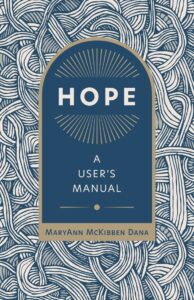 Hope: A User’s Manual Mary McKibben Dana (Eerdmans) $16.99 OUR SALE PRICE = $13.59
Hope: A User’s Manual Mary McKibben Dana (Eerdmans) $16.99 OUR SALE PRICE = $13.59
RELEASE DATE – AUGUST 20, 2022
This is a lovely little book, one I have been dipping into these past hard weeks. Mary McKibben Dana is a fun writer, thoughtful and clear; as a younger woman she wrote the excellent Sabbath in the Suburbs: A Family’s Experiment with Holy Time, one of the first books I read of this sort, which was a memoir about sabbath-keeping. Later, I enjoyed her impressive God, Improv, and the Art of Living in which she tells her story of taking improv comedy lessons and what she learned as a pastor doing that kind of unusual (and unusually funny) work. In both cases she was letting us in on parts of her life, going public without fear or shame and telling with verve a bit about her upbeat adventures.
This new one is more substantive although is still mostly conversational in tone. The chapters are only a few pages long (and are followed by a reflection question to ponder and a practice to explore. Yay. Ms Dana is herself a writer, speaker, and ministry coach while she continues to pastor. The book emerged during the worst of the pandemic and seasons of quarantine. What is hope? How can it be resilient enough “to endure crises and crushing defeats without forsaking the here and now.” Having just come from our Bible study in the 20-some chapters of Isaiah, man, I’m telling you, this rings true. We need it.
As they say on the back, “This is a book about real hope” which she define as a “spiritual counter narrative.” That is, it is not a cheap hope, the sort of culture tends to peddle. It is the more resilient kind since, after all, we need the virtue of hopeful vision exactly when things are bleak. And, it seems to me, her “counternarrative” vision sets this “user’s manual” apart from some of the more simplistic views in books out there, helpful as they may be at times. This is a deeper dive,without being arcane or obscure.
Here is how Eerdman’s put it:
Hope is not optimism. It’s not toxic positivity. It’s not a promise of future success or progress. And it’s definitely not something that can be reduced to a scripty-font platitude on an Instagram post.
So what is it?
One thing is certain: real hope demands that we do something with it. That we live it out. That we use hope to participate in a bigger story playing out behind the bleak world we see on the news or in our social media feeds every day.
It doesn’t matter whether you’re a person of faith, or someone disillusioned with faith, or someone who hardly ever thinks about faith: if you’re a human being who longs for a spiritual counter-narrative to live by, this book points to one resilient enough to endure crises and crushing defeats. If you’re tired of hearing about some heavenly hereafter amid the pressing need for justice here and now, this is a book about hope for this world–not the next.
After exploring what hope isn’t and then what it is, MaryAnn McKibben Dana reflects on the surprising place where hope is often found–in the messiness of our imperfect, flawed, beautiful human bodies. In the second half of the book, she talks about making hope real: sharing hope through stories, cultivating hope through simple practices, and nurturing hope in hopeless times–when only real hope can persevere.
I can’t say enough wonderful things about MaryAnn McKibben Dana’s latest book. You must stop everything you are doing and read it now! Hope: A User’s Manual is a well-researched, thought-provoking, and wise guide to approaching life’s most unexpected and difficult moments. This book will be one I return to often for encouragement and share with many. — Elizabeth Hagan, author of Brave Church: Tackling Tough Topics Together
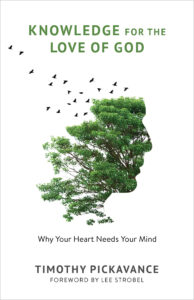 Knowledge for the Love of God: Why Your Heart Needs Your Mind Timothy Pickavance (Eerdmans) $18.99 OUR SALE PRICE = $15.19
Knowledge for the Love of God: Why Your Heart Needs Your Mind Timothy Pickavance (Eerdmans) $18.99 OUR SALE PRICE = $15.19
RELEASE DATE – AUGUST 25, 2022
We just got our stack of these in, a bit early, and I’m glad to have them. It is a good book to suggest, especially for those who need some reminder of the balance (so to speak) of hearts and minds. Although it is not a philosophical piece, it is solid; although it is not particularly postmodern, it isn’t merely a logical call to intellectual credibility. Notice the evocative title again: Knowledge for the Love of God. Doesn’t that sound rich?
As Kelly Kapic (author of You’re Only Human: How Your Limits Reflect God’s Design and Why That’s Good News) puts it:
“Timothy Pickavance wonderfully avoids the traps of naive gullibility blind faith on the one hand and depersonalized and arrogant rationalism on the other.”
Anyone who can (in Kapic’s words) “ably situate the Christian faith reasonably within [both] scientific methodology and the place stories or testimonies, helping uprightly value knowledge in a way that both resonates with our experience and appropriately leans upon God’s self-revelation” has my ears. We can affirm our minds as gifts from God but we can honor their limits, too. Reason, in this book, is not a god or idol (but certainly not a boogeyman, either.) Let’s hear it for balance and multi-dimensional knowing and deep wisdom!
As the publisher suggests: “The reality is that our formation into Christlikeness relies heavily on our minds and that Christian belief is about thinking more, not less. Far from being a threat, the intellect is central to faith–so long as it is treated as an instrument of worship rather than as the object of worship.”
They continue:
Knowledge for the Love of God is for followers of Jesus needing to better understand the crucial connection between faith and rationality. Timothy Pickavance shows how learning about who God is and what he has done, is doing, and will do draws us closer to him — just as in any relationship. With stories from his own experiences wrestling with this aspect of faith, Pickavance relates a compelling vision of how cultivating the intellect strengthens our Christian worldview, helps us gain freedom in Christ, and enables us to love God with our whole being. Discussion questions at the end of each chapter make this a book to be fruitfully shared among fellow believers desiring a deeper faith–one of heart, soul, strength, and mind.
This is a clear-headed and thoughtful call for those who want a solid and well informed faith. The author is scholar in residence in his PCA Church and is a philosophy prof at Talbot 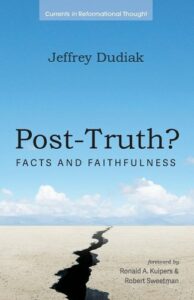 School of Theology at Biola. I did wish for just a bit more overt discussion about what facts and true truths are — so I suggest the recent, short volume Post-Truth: Facts and Faithfulness by Jeffrey Dudiak (Cascade; $12.00) to read along with it. This is in the ICS-created “Currents in Reformational Thought” series and in it, ICS grad and current college prof Dudiak explores “the fissures and fractures that vex our”post truth” era, searching for a deeper, dare we say truer, understanding of the cultural forces that have led North American society to become so polarized.” It is a true gem for thoughtful critics of an unexamined view of truthfulness.
School of Theology at Biola. I did wish for just a bit more overt discussion about what facts and true truths are — so I suggest the recent, short volume Post-Truth: Facts and Faithfulness by Jeffrey Dudiak (Cascade; $12.00) to read along with it. This is in the ICS-created “Currents in Reformational Thought” series and in it, ICS grad and current college prof Dudiak explores “the fissures and fractures that vex our”post truth” era, searching for a deeper, dare we say truer, understanding of the cultural forces that have led North American society to become so polarized.” It is a true gem for thoughtful critics of an unexamined view of truthfulness.
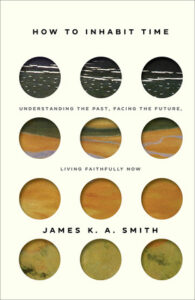 How to Inhabit Time: Understanding the Past, Facing the Future, Living Faithfully Now James K. A. Smith (Brazos Press) $24.99 OUR SALE PRICE = $19.99
How to Inhabit Time: Understanding the Past, Facing the Future, Living Faithfully Now James K. A. Smith (Brazos Press) $24.99 OUR SALE PRICE = $19.99
RELEASE DATE – SEPTEMBER 20, 2022
When you pre-order this forthcoming release from us we’ll send along a nice little free journal, a guided workbook resource to accompany the volume, compliments of the good folks at his publishing house, Brazos Press. While supplies last.
This is a book that I will certainly want to review more carefully — I have a lot to say about it as I’ve been pondering an early manuscript — but that I can summarize pretty quickly. It is a book, for starters, for fans of the work of James K.A. Smith, who friends call Jamie. I really think he is one of the most important and interesting writers of our day. His generous and insightful interactions with other authors — from ancient philosophers to contemporary scholars — is notable and his writing is interesting. I mean that, he is always interesting. If you have read You Are What You Love or On the Road with Saint Augustine or his collection of pieces in the Calvin College Press release, Discipleship in the Present Tense: Reflections on Faith and Culture you know what I mean.
However, if you are not a fan of Smith, this forthcoming one may not be the first you should take up. In How to Inhabit Time he alludes to other works of his, from the readable and wise Augustine volume (which is highly recommended!) to his early and very important The Fall of Interpretation: Philosophical Foundations for a Creational Hermeneutic, to the mighty conclusion of his cultural liturgies set, Awaiting the King: Reforming Public Theology. There are moments when I was quite glad that I read his overview of the complex Charles Taylor — he was ahead of the trend on that one, for sure! — called How (Not) To Be Secular. At the very least you should know his best-selling You Are What You Love. Please order that one ASAP if you are one of the few who have not yet had the pleasure. And, to be honest, this does seem to come on the heels of his last trade book, the wonderful On The Road with Saint Augustine.
Yet, there are those who may want to dive into this not because they are drawn to the author but because they are intrigued with the topic and are taken by the themes. Please, please do. I am a big fan of this, dense as some parts are, complex as it may be. Because I trust him so, and value his voice and writing, I hear him and smile when he warns in the long introduction that citing philosophers (not unlike citing poets and artists) is a chance for the reader to slow down. To ponder and reflect. This is a book which, he says, hopes to draw you more deeply into contemplation. It is, very much, about inhabiting.
Look: there are other books on the formative power of the liturgical calendar; attending to the themes of the “church year” has become a more popular of late, even among those who are not members of sacramental churches. But How to Inhabit Time, while rooted in a liturgically shaped sense of the seasons, is more (much more) than a book about the church calendar. It is, as the title says, literally about time.
Again, there are good books about using time and even time management. This is not one of them. The second sentence warns, “If it promises guidance on how to inhabit time, please don’t expect formulas or methods or tips for managing your day planner.” (As if we’d expect Jamie to offer such mundane tips.) He continues,
Instead, the hope of this book is to occasion an awakening, a dawning awareness of what pitmans to be the sorts of creatures who dwell in the flux of time’s flow, who swim in the river of history. Knowing when we are can change everything.
Although it waxes eloquent at times about all manner of obscure goings on and explores in detail stuff like “A History of the Human Heart” and “The Sacred Folds of Kairos” or, as that chapter subtitle puts it, “How (Not) To Be Contemporary” it is at times clear and convicting. Very early on, and then several times later, he asserts:
Knowing whether it’s dawn or dusk changes how you live in the next moment.
To wit, he coins an annoying little word he uses throughout, about a debilitating ignorance about not knowing what time it is, or thinking we (and God!) somehow “floats” above it all, not concerned about being in time and in history: nowhen.
This is a book about temporality — which implies an awareness of where we are in history, how we have been generated and how we are to feel about it all; and, he is eager to help us understand the grace of living, appropriately, in a futural manner. The now is pregnant with the future and we live into God’s realm in fresh aways each day. But first, of course, we must reckon with our past. I really resonated with how he used that word, reckoning.
With examples from the tangible, visible arts to poets and rock singers, with studies from philosophers and social critics, with plenty of Bible and church history How to Inhabit Time is a masterpiece, one of the best books 2022. Even if it is a time a bit arcane, a bit dense, a harder work that his most popular few of recent years.
When I review this more carefully, later, I will describe my reactions to his chapter “Embrace the Ephemeral” (which, happily, starts with a description driving through our local Susquehanna Valley in late October.) And I will share how much I enjoyed his “Seasons of the Heart” chapter helping us to “inhabit your now.” (Ahh, his bits about the Grand Rapids community garden are very sweet.) His deeper dive into the classic “a time for…” section of Ecclesiastes 3 (cue up Pete Seeger about here, or Cockburn’s version, if you like — it’s not the first Cockburn allusion) is richer than most of the obvious explication in standard commentaries. His call to discern the times cites Gaudete et exsultate, Pope Francis’s exhortation on holiness in today’s world and he explores how “seasons are transitory yet focal.” All of this is remarkably rich and very thoughtful and, yes — inspiring. From a Fleet Foxes song to a passage lifted from Proust, we come to see how in harder, quieter seasons we can learn much, even as we are attuned to Scripture differently than before. Smith notes that,
“…a life lived with God through time is a period of incubation in which the Spirit of God is creating the capacity within us to hear the same Word anew and to make the Word echo afresh in the new crevices of our heart.”
We are creatures of time. There are, as he notes more than once, vicissitudes. Jamie is a smart guy with a great vocabulary, but he is also a tender guy, sharing about his own depression, drawing out the contours of his homes, celebrating his marriage, a witness that it is. He is also a philosopher so expect some forays into some deep stuff, but even that is clever and readable. Only Smith calls Huesserl, whom he loves, “a fusty German” and draws on Kierkegaard and Martin Heidegger (a student Kierkegaard) as well as Henri Bergson, “the great turn-of-the-century phenomenologist of time (where Proust was the best man at his wedding!)” Who knew?
Yes, you get some cool lines from the Avett Brothers and he cites the moving memoir of Brandi Carlisle and he goes on, righteously, about BLM and Alice Walker’s food revolutions. But you also hear his calm ruminations on Reinhold Niebuhr and other heavyweight thinkers. (Did you see his piece in the Christian Century about Niebuhr? It was quite good.) From Winn Collier’s lovely recollection of Eugene Peterson’s “aha” moment about becoming “unhurried” (as told in Winn’s biography, A Burning in My Bones) to his citation of a beautiful passage on leisure by Calvin Seerveld, he helps us live into the vicissitudes, and hear the “tempo of the Spirit.” I told you it was interesting.
I’ll say more about this in another review later, but I’m delighted to be challenged to think more about being an eschatological person (or, better, to be part of a eschatological people.) The notion of longing for “kingdom come” is different, of course, than (as he explains beautifully) counting down the days to a rapture; fixation on the end times, he curiously shows, is, actually, rather a-historical, as we wait for God to wipe the slate clean. His vision of God’s renewal of all things is very, very different — nor nowhen.
James K. A. Smith shows us that time is a gift waiting to be redeemed, and a central conviction of this book is that ‘the Lord of the star fields’ is intimately attuned to our haunted, beautiful histories. Dwelling with these lucid, winsome meditations on ‘spiritual timekeeping’ was like listening in on a lively conversation between St. Augustine, Gustavo Gutiérrez, James Baldwin, and Marilynne Robinson, while Pink Floyd’s Dark Side of the Moon played in the background. — Fred Bahnson, author of Soil and Sacrament
James K. A. Smith’s inspired work examines time not as hourglass sand running hopelessly through our fingers but as a divine gift that we can capture just enough to recognize the pearl of life that time shapes. A thoughtful and engaging book. — Sophfronia Scott, author of The Seeker and the Monk: Everyday Conversations with Thomas Merton
As mentioned, pre-order it from us and we’ll send along a nice little free journal, a guided workbook resource to accompany the volume, compliments of the good folks at his publishing house, Brazos Press.) While supplies last.
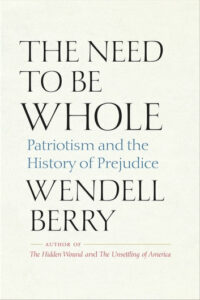 The Need to Be Whole: Patriotism and the History of Prejudice Wendell Berry (Shoemaker & Company) $24.00 OUR SALE PRICE =$19.20
The Need to Be Whole: Patriotism and the History of Prejudice Wendell Berry (Shoemaker & Company) $24.00 OUR SALE PRICE =$19.20
RELEASE DATE OCTOBER 4, 2022
Well, we announced this earlier and have some pre-orders already — thank you. However, they have pushed back the released date of this from early September to early October. It is going to be well worth waiting for, believe me.
Here are three things you should know, offered as succinctly as I can say.
Firstly, this is truly a major work. It is not a collection of essays, not (as far as I can tell) anything previously published elsewhere. This is a major contribution, one that he says in the forward, he started after being aware in 1969 when he realized the first edition of The Hidden Wound was inadequate for all he wanted (and needed) to say; it was published in 1970 and we might consider this somewhat of a long-awaited sequel.
As I hope you know, Mr. Berry’s perhaps most enduring nonfiction volume came out in 1977, The Unsettling of America, still an essential read. In a very true manner, the forthcoming The Need to Be Whole is bringing together those two seminal volumes, “exploring the themes of racial division and the devastation of land-based communities.” I am sure I do not need to tell you that Berry sees our country fraught with destruction and disorder. So this is hugely significant, for Wendell and for the literary community. For many, it may be the publishing event of the year.
Secondly, it is a conversation of hope. Parts seem overtly faith-based, as some of his work is. But he unfolds that slowly and carefully — I didn’t say tediously, but, as I’m sure you know, there are more lively essayists. But this is important and I’m working my way through it, slowly. There is a lot of history, some Kentucky history, citations of civil war and abolitionist stuff. He has called it “pondering and ponderous.” My advanced reader’s copy that I was lucky to acquire is nearly 500 pages. So, in that sense, it is, again, huge.
Thirdly, just to be clear, it is a study of the “land ethic” of Aldo Leopald and so much more, showing his love of place (and therefore and properly nuanced sort of patriotism) and how racial injustice has afflicted people, even as displacement from the land has hurt us all. Which is to say it is not trendy or breathy; it is more about (or so it seems) the implications of, oh, say, Allen Tate or Robert Penn Warren (and Robert E. Lee, actually) than Ferguson or George Floyd. Berry says the book is bound to offend. He opens the book with what strikes me as an endearing bit about a meeting with bell hooks and also tells of a correspondence with Eddie Glaude, Jr. That he is fond of Ernest Gaines (and his Gathering of Old Men published in 1983) should be evident. He is less fond, you will find, of the anti-rural snobbery of Paul Krugman. Believe me, you should pre-order this today.
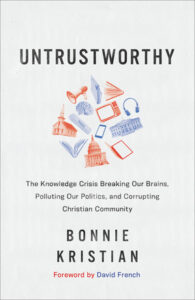 Untrustworthy: The Knowledge Crisis Breaking Our Brains, Polluting Our Politics, and Corrupting Christian Community Bonnie Kristian (Brazos Press) $24.99 OUR SALE PRICE = $19.99
Untrustworthy: The Knowledge Crisis Breaking Our Brains, Polluting Our Politics, and Corrupting Christian Community Bonnie Kristian (Brazos Press) $24.99 OUR SALE PRICE = $19.99
RELEASE DATE – OCTOBER 11, 2022
I wish this book were coming sooner as we hardly have time to spare in getting a handle on this increasingly complex matter, what we know and how we know it, the conspiracies fellow citizens promote and believe and how it is dividing our land and even our churches. While not exactly like the book I alluded to above, Post-Truth: Facts and Faithfulness by Jeffrey Dudiak, it is a practical study of the rippling results of a “truthiness” culture and, now, the odd acceptability of conspiracy theories. Wow.
A few short years ago I scoffed at QAnon, confident that no serious-minded person would fall for that. Now we’ve got Eric Metaxas continuing towards madness and the Republican candidate for Governor of our Keystone State is enmeshed in exceptional far right weirdness and some of his fans— some posting violent pseudo-patriotic threats— are cult-like in their devotion. We have, indeed, what Bonnie Kristian calls a “knowledge crisis.”
I know there are many books about polarization, and a few on the untrustworthy situation with many neighbors and friends falling for certifiable nonsense. (Like the claim that former President Trump won the 2020 election, just for example.) This is the first book that I know of that brings a thoughtful Christian perspective to this very question. With an impressive forward by David French, I am hoping this lively book gets plenty of publicity. We need it.
Bonnie Kristian is a great writer, so that makes this important book that much more fun. Her earlier book was a brilliant doozy — showing for seekers or those in the throes of deconstruction, before it was called that, how there are many sorts of Christian habits and spiritual practices galore, all within an arguable spectrum of orthodox reliability. From Amish farmers to urban PCA hipsters, from Orthodox monks to Pentecostal miracle-workers, A Flexible Faith: Rethinking What It Means to Follow Jesus Today had lots of sidebar interviews, good questions to ponder, and offered more truly Christian options for those considering faith than you can imagine. It’s a great read and, if read widely, would do a lot for ecumenicity, since it shows that despite varying faith practices and worship styles, there are a lot of good folks who are followers of Jesus. Our faith — or at least our sense of who is in and who is out — can benefit from a bit of flexibility. And Kristian Bonnie is a great reporter, hearing the stories and framing it out for us in helpful ways.
Although I haven’t noticed in my early review manuscript that she renounces any reasonable sorts of faith, she is clear in Untrustworthy: not everything should be accepted as truthful and not every claim is trustworthy. Although her extensive journalistic effort putting together the fabulously broad Flexible Faith gave her plenty of experience with what some might consider the fringes of the Christian tradition (monks and mystics, Pentecostals and protestors, etc.) the conspiracy-addled folk she explores here are not another plausible option. This is life and death stuff. There is, she warns, a real crisis of truth in American life, faith, and politics.
I would wade through this like it was the forthcoming serious Wendell Berry book if I had to — it is that important! — but, gladly, it is written with great wit and grace. The chapter titles are mostly one-word phrases, looking at manifestations of the crisis in “media” and “mob.” She looks at “Schemes” and “Skepticism.” There is a move towards “a practical epistemology” and while I’m a geek for epistemological arguments (please read some Esther Meek, starting with the simple and provocative A Little Manual for Knowing) I often advise normal folks to skip books that sounds too philosophical. But not this — Bonnie is a Pittsburgh-based journalist, not a heady academic, and her chapter on emotions and her chapter on experience offers insights into how we develop a wise and watching worldview. Chapter 9 is called “A Building Plan” — don’t miss it.
The blurbs on this speak well to how this book can help us overcome current polarization through meaningful commitments to decent relationships and “building trust across fractured communities” (as Karen Swallow Prior puts it in her soberly raving review.)
Hear Front Porch Republic blogger and author of the wise, slow approach to news and media consumption (Reading the Times), Jeffrey Bilbro, who says this of Untrustworthy:
Many of us have a sense that all we once took for granted is now up for grabs. We are living through a crisis of knowledge, and the result can be a feeling of suffocating uncertainty. Untrustworthy opens a window and lets in a breath of fresh air–and hope. Bonnie Kristian offers a way out of pointless debates and fearmongering conspiracy theories. This book is never condescending and always sympathetic; it is never partisan and always incisive. — Jeffrey Bilbro, author, Reading the Times
Our country’s epistemological crisis is perhaps the greatest threat to democracy. And while it’s tempting to feel hopeless in light of ‘fake news’ and people who speak ‘their truth,’ Kristian offers us ways to move forward. Untrustworthy is an incisive, deeply researched, and personal analysis of our truth crisis. It should be widely read and discussed. — Alan Noble, professor and author of You Are Not Your Own.
The publisher summarizes it clearly: Drawing from her extensive experience in journalism and her training as a theologian, Kristian explores social media, political and digital culture, online paranoia, and the press itself. She explains factors that contribute to our confusion and helps Christians pay attention to how we consume content and think about truth. Finally, she provides specific ways to take action, empowering readers to avoid succumbing to or fueling the knowledge crisis.
Order several today and we will ship them as soon as it arrives in early October. Yes!
++++
TO PLACE AN ORDER
PLEASE READ AND THEN CLICK ON THE “ORDER HERE” LINK BELOW.
It is helpful if you would tell us how you prefer us to ship your orders. The weight and destination of your package varies but you can use this as a general guide.
There are generally two kinds of US Mail options, and, of course, UPS. If necessary, we can do overnight and other expedited methods, too. Just ask.
- United States Postal Service has the option called “Media Mail” which is cheapest but can be slow. For one typical book, usually, it’s about $3.50.
- United States Postal Service has another option called “Priority Mail” which is $8.35 if it fits in a flat rate envelope. Many children’s books and some Bibles are oversized so that might take the next size up which is $8.95. “Priority Mail” gets much more attention than does “Media Mail” and is often just a few days to anywhere in the US.
- UPS Ground is reliable but varies by weight and distance and may take longer than USPS. We’re happy to figure out your options for you once we know what you want.
If you just want to say “cheapest” that is fine. If you are eager and don’t want the slowest method, do say so. It really helps us serve you well.
– DON’T FORGET TO LET US KNOW WHAT SHIPPING METHOD YOU PREFER –
BookNotes
SPECIAL
DISCOUNT
20% OFF
ALL BOOKS MENTIONED
+++
order here
this takes you to the secure Hearts & Minds order form page
just tell us what you want to order
inquire here
if you have questions or need more information
just ask us what you want to know
Hearts & Minds 234 East Main Street Dallastown PA 17313
read@heartsandmindsbooks.com
717-246-3333
It is complicated for us, but we are still closed for in-store browsing due to our commitment to public health (not to mention the safety of our staff and customers.) The vaccination rate here in York County is sadly lower than average and the new variant is now spreading. Our store is a bit cramped without top-notch ventilation so we are trying to be wise and faithful.
Please, wherever you are, do your best to be sensitive to those who are most at risk. Many of our friends, neighbors, co-workers, congregants, and family members may need to be protected since more than half of Americans (it seems) have medical reasons to worry about longer hazards from even seemingly mild Covid infections.
We are doing our famous curb-side customer service and can show any number of items to you if you call us from our back parking lot. We are eager to serve and grateful for your patience as we all work to mitigate the pandemic.
Of course, we’re happy to ship books anywhere. Just tell us how you want them sent.
We are here 10:00 – 6:00 EST / Monday – Saturday, closed on Sunday.

